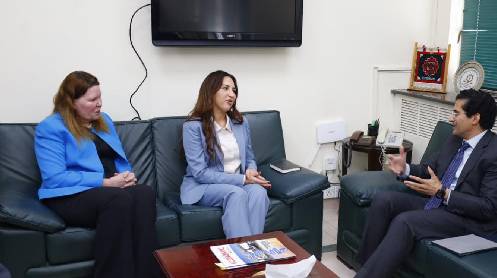ISLAMABAD: Federal Minister for Energy Omar Ayub announced on Wednesday that the new energy policy has been approved for making a major shift to electricity generation to renewable and alternative sources in Pakistan, ARY News reported.
Omar Ayub, while addressing a press conference along with Special Assistant to the Prime Minister on Petroleum Division Nadeem Babar in Islamabad today, said that the rate of power generation will be increased up to 20 per cent by using domestic reserves of renewable and alternative electricity projects.
He detailed that the country will be able to domestically produce electricity up to 60 per cent by 2030. The policy was earlier approved by the Council of Common Interests (CCI).
The federal minister said that the bidding process is being initiated for the renewable electricity projects, whereas, the scientists and engineers are busy in locally preparing power generation equipment.
“We will produce power up to 10 per cent through Thar coal reserves and up to 60 per cent of electricity will be generated through the domestic reserves by 2030. At this time, the power generation is dependent on imported oil and gas. The new energy policy will also help the authorities to reduce electricity tariff.”
“Low-cost electricity will benefit industries and domestic consumers. Moreover, the power authorities will also produce electricity through the solar system with the assistance of science and technology. The projects for alternative energy production will also create employment in the country.”
Nadeem Babar said that the bidding process will be completed in a transparent manner under the new energy policy. The previous policies had been designed on the basis of the US Dollar’s valuation. He added that the authorities will organise bidding events annually for the renewable energy sector.
‘The federal government is giving concession on equipment of renewable energy, whereas, the necessary machinery will be prepared locally. The federal authorities will analyse the power demand of the national grid.’
‘Three firms including Chinese and European companies showed interests in investment in the sector. Open bidding will be organised for renewable energy projects. The federal government will also include all provinces, Azad Jammu and Kashmir (AJK) and Gilgit-Baltistan (GB).”
“Steps are being taken for technological transfer by the federal government with the assistance of science and technology, whereas, contacts have been made with the foreign companies for wind turbines and solar panel. We are making the best mechanism to overcome the shortage of electricity.”
“The government will import Customs duty and tax-free machinery for the projects and only withholding tax will be applied to it. [Under the new energy policy,] the payments will only be made against the power generation capacity instead of fixed capacity payment. At this time, per unit of renewable energy costs four cents while the open bidding will reduce its cost to three cents.”





